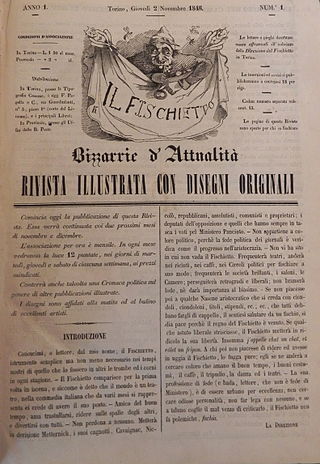Related Research Articles

Leo Valiani was an Italian historian, politician, and journalist.
The Action Party was a liberal-socialist political party in Italy. The party was anti-fascist and republican. Its prominent leaders were Carlo Rosselli, Ferruccio Parri, Emilio Lussu and Ugo La Malfa. Other prominent members included Leone Ginzburg, Ernesto de Martino, Norberto Bobbio, Riccardo Lombardi, Vittorio Foa and the Nobel-winning poet Eugenio Montale.

Nuovi Argomenti is an Italian literary magazine which was started in 1953 in Rome.

Piero Calamandrei was an Italian author, jurist, soldier, university professor, and politician. Born in Florence, he was one of Italy's leading authorities on the law of civil procedure.
Aut Aut is a critical philosophy and literary magazine published in Milan, Italy. Its name is of Latin origin and refers to existential choice and also, to Søren Kierkegaard's either/or conceptualization.

Il Mondo was a weekly political, cultural and economic magazine founded by Gianni Mazzocchi and directed by Mario Pannunzio. It existed between 1949 and 2014.
Il Borghese is a monthly cultural and political magazine with a right-wing stance published in Rome, Italy. The magazine has been in circulation since 1950 and is named after the conservative Borghese family.
Comunità was a cultural magazine published in Rome, Italy. The magazine was in circulation between 1946 and 1960.
Il Frontespizio was an Italian art and literary magazine, which had a Catholic perspective. The magazine existed between 1929 and 1940 and was based in Florence, Italy.
Solaria was a modernist literary magazine published in Florence, Italy, between 1926 and 1936. The title is a reference to the city of sun. The magazine is known for its significant influence on young Italian writers. It was one of the publications which contributed to the development of the concept of Europeanism.
Società was an Italian communist cultural magazine published in Italy between 1945 and 1961.
Rinascita was a political and cultural magazine published in Rome, Italy, between 1944 and March 1991. It was one of the media outlets of Italian Communist Party (PCI).
Preuves was a French language monthly political and cultural magazine which existed between 1951 and 1975 and was headquartered in Paris, France. It was the first publication launched by the Congress for Cultural Freedom which later started other magazines, including Cuadernos, Encounter, Survey, Tempo Presente and Der Monat.
Tempo Presente was a monthly political magazine which existed between 1956 and 1967 in Rome, Italy. It was supported by the Congress for Cultural Freedom which published other magazines, including Cuadernos, Encounter, Survey and Der Monat.
Yamato was an Italian monthly propaganda magazine which existed between early 1941 and August 1943. The magazine aimed at making the Japanese culture much more familiar in Italy and featured articles written in Italian and Japanese. Its subtitle was Mensile Italo-Giapponese.

La Difesa della Razza was a Fascist magazine which was published in Rome between 1938 and 1943 during the Fascist rule in Italy. Its subtitle was Scienza, Documentazione, Polemica. It played a significant role in the implementation of the racial ideology following the invasion of Ethiopia and the introduction of the racial laws in 1938.

Il Baretti was a monthly literary magazine which was one of the publications launched and edited by Piero Gobetti. The magazine was published in Turin in the period between 1924 and 1928. The title was a reference to Giuseppe Baretti, who was an author in the eighteenth century, an exile and pre-romantic pilgrim.
Lo Stato was a monthly political and finance magazine which existed in the Fascist Italy between 1930 and 1943. Its subtitle was Rivista di scienze politiche e giuridiche.

Il Fischietto was a political satire magazine published in Turin between 1848 and 1916. It was among the most important Italian satirical magazines of its time. Its subtitle was Bizzarrie d'attuale - Rivista illustrata con disegni originali.
References
- ↑ "Storia". Il Ponte (in Italian). Retrieved 18 January 2024.
- 1 2 3 "Il ponte". biblio.liuc.it (in Italian). Retrieved 18 January 2024.
- ↑ Hanna Eklund (April 2016). "Judicial review and social progress in the work of Mauro Cappelletti and today". International Journal of Constitutional Law . 14 (2): 488. doi:10.1093/icon/mow026.
- 1 2 "Il Ponte: rivista mensile diretta da Piero Calamandrei". unifi.it (in Italian). Retrieved 18 January 2024.
- ↑ Karl Ludwig Selig (September 1956). "The Cultural Periodicals in Italy, 1945-1950". Italica. 33 (3): 217. JSTOR 477345.
- 1 2 Sergio J. Pacifici (Autumn 1955). "Current Italian Literary Periodicals: A Descriptive Checklist". Books Abroad. 29 (4): 409–412. doi:10.2307/40094752. JSTOR 40094752.
- ↑ Juri Meda (2019). "The "Agony of the School" in Southern Italy in the Images of Italian Photojournalists, 1940s– 1950s". In Karin Priem; Giovanna Hendel; Carole Naggar (eds.). They did not stop at Eboli. Vol. 1. Berlin: De Gruyter Oldenbourg. p. 199. doi:10.1515/9783110655599-011. ISBN 978-3-11-065175-1.
- ↑ Carla Cuomo; Sally Davies (2017). "Massimo Mila, The Prismatic Intellectual: An Archival Case Study". Fontes Artis Musicae. 64 (3): 281. JSTOR 26769846.
- ↑ Diego Guzzi (2012). "The myth of the "good italian", the anti-semitism and the colonial crimes". Constelaciones: Revista de Teoría Crítica. 4: 261.
- ↑ Vanni D'Alessio (2015). "Leo Weiczen Valiani and his Multilayered Identities: An Introduction". Časopis za povijest Zapadne Hrvatske. 10: 13.
- ↑ Laura De Giorgi (2022). "Between "Yellow" and "Red": Stereotypes and Racial Discourses in 1950s Italian Narratives of Communist China". In Marcella Simoni; Davide Lombardo (eds.). Languages of Discrimination and Racism in Twentieth-Century Italy. Histories, Legacies and Practices. Cham: Palgrave Macmillan. pp. 137–138. doi:10.1007/978-3-030-98657-5_6. ISBN 978-3-030-98657-5.
- ↑ Chiara Morbi; Paola Carlucci (2017). "Beyond the Cold War: Tempo Presente in Italy". In Giles Scott-Smith; Charlotte A. Lerg (eds.). Campaigning Culture and the Global Cold War. London: Palgrave Macmillan. p. 130. doi:10.1057/978-1-137-59867-7_7. ISBN 978-1-137-59866-0.